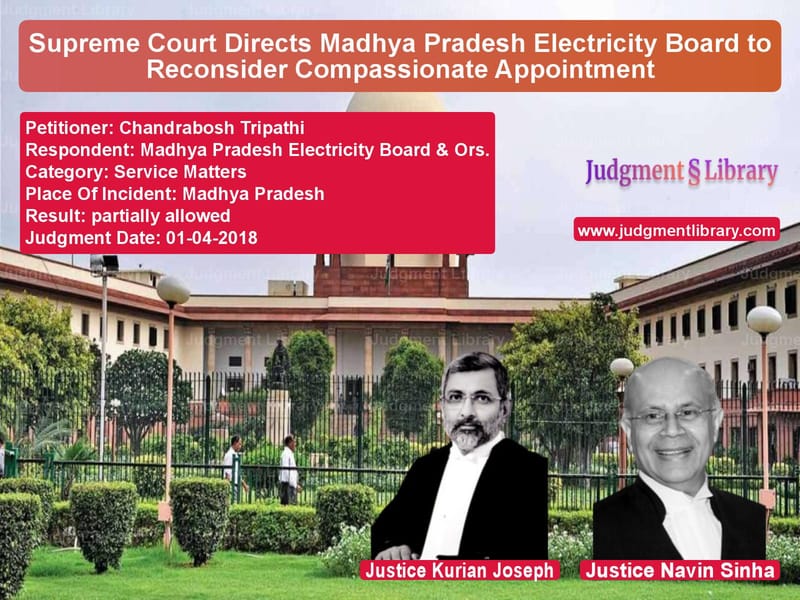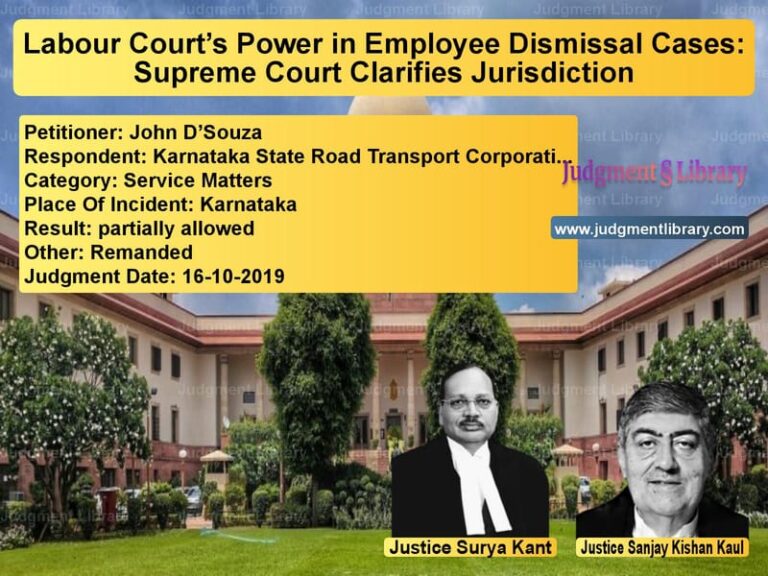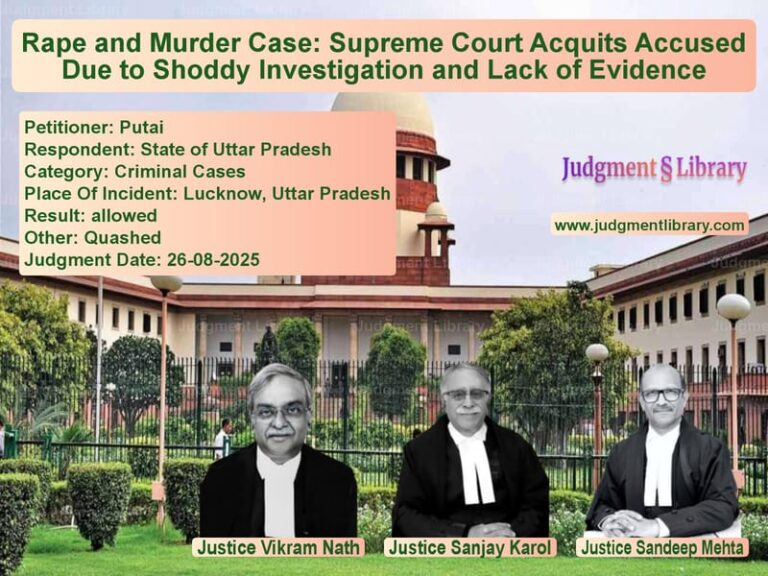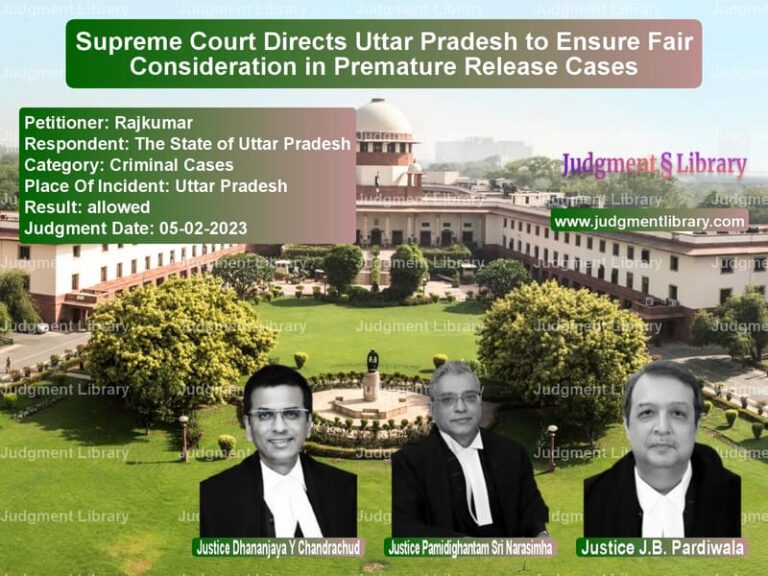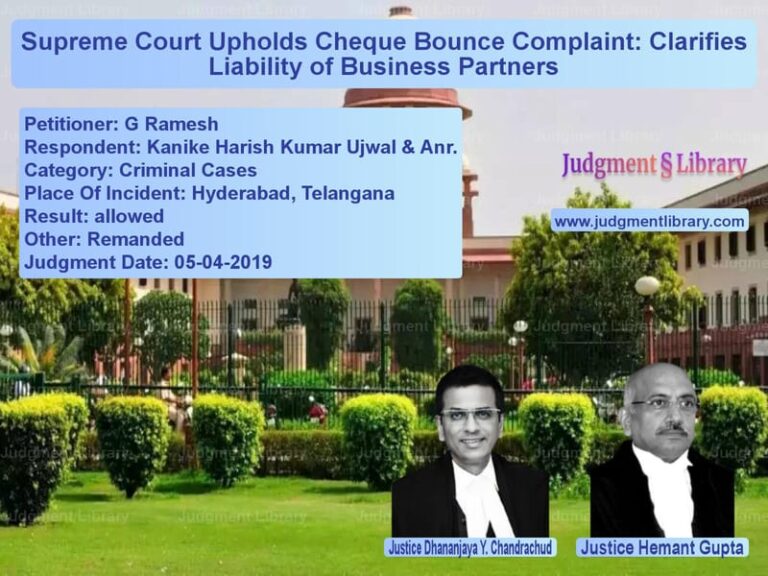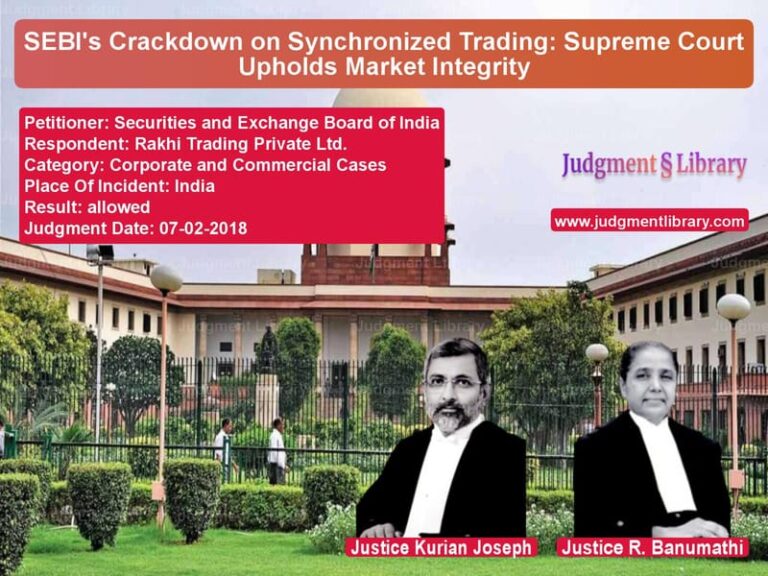Supreme Court Directs Madhya Pradesh Electricity Board to Reconsider Compassionate Appointment
The Supreme Court of India recently ruled on the issue of compassionate appointment in the case of Chandrabosh Tripathi v. Madhya Pradesh Electricity Board & Ors.. The appellant, Chandrabosh Tripathi, approached the Supreme Court after his application for a compassionate job was denied. The case revolved around the fundamental principle of whether the Electricity Board was justified in rejecting his claim and if vacancies and eligibility conditions warranted reconsideration.
Background of the Case
The concept of compassionate appointment is intended to provide immediate relief to families who suffer the loss of their primary breadwinner while in government or public sector service. The Madhya Pradesh Electricity Board had earlier rejected the appellant’s claim, leading to a legal dispute that escalated to the Supreme Court.
Key Facts:
- The appellant applied for compassionate appointment following the demise of his father, who was employed with the Madhya Pradesh Electricity Board.
- The Board turned down his request, citing a lack of vacancies and eligibility concerns.
- The appellant challenged the rejection before the High Court, but his petition was dismissed.
- The Supreme Court granted leave to appeal and directed the Board to reconsider the application.
Petitioner’s (Chandrabosh Tripathi) Arguments
- The appellant contended that he fulfilled all eligibility criteria for compassionate appointment.
- He argued that the Board had vacancies but arbitrarily denied him a job.
- The rejection was unjust and contrary to the principle of helping families of deceased employees.
- The High Court failed to properly assess his grievance, prompting him to seek redress in the Supreme Court.
Respondent’s (Madhya Pradesh Electricity Board) Arguments
- The Board claimed that compassionate appointment is not an automatic right.
- It argued that vacancies were limited and that appointments were subject to availability.
- The Board emphasized that selection was based on eligibility conditions, which the appellant allegedly did not fulfill.
Supreme Court’s Observations
The Supreme Court examined the facts and directed the Board to reconsider the appellant’s case, making the following observations:
- “The appellant’s case is under consideration on two counts: (i) eligibility and (ii) availability of vacancies.”
- “The rejection of the application does not appear to have been made after a fair assessment of his eligibility.”
- “The Board is directed to complete formalities and pass formal orders within three weeks.”
- “The earlier judgment and review order will not stand in the way of reconsidering the appellant’s case in light of the peculiar facts of this case.”
Key Legal Precedents Considered
- Umesh Kumar Nagpal v. State of Haryana (1994) – Established that compassionate appointment is an exception to the normal recruitment process.
- MGB Gramin Bank v. Chakrawarti Singh (2014) – Clarified that such appointments must be based on financial hardship and cannot be claimed as a matter of right.
- State of Haryana v. Ankur Gupta (2003) – Stressed that the policy must be implemented fairly and in accordance with eligibility norms.
Final Judgment
The Supreme Court disposed of the appeal with the following directions:
“The respondent Board shall complete the formalities and pass formal orders within three weeks from today. The judgment under appeal shall not stand in the way of reconsideration of the appellant’s case.”
The Court further ruled that there would be no cost implications for either party.
Significance of the Judgment
The ruling reinforces several key principles:
- Fair Consideration: The Supreme Court emphasized that compassionate appointments must be processed transparently.
- No Arbitrary Rejections: Authorities must evaluate applications based on merit rather than blanket denials.
- Accountability of Public Sector Employers: Government and public sector bodies must justify refusals to provide employment under such schemes.
Conclusion
The Supreme Court’s ruling in Chandrabosh Tripathi v. Madhya Pradesh Electricity Board upholds the principle that compassionate appointment schemes must be implemented in a fair and just manner. By directing the Board to reconsider the case within a stipulated period, the judgment ensures that the rights of deserving candidates are not arbitrarily denied.
Petitioner Name: Chandrabosh Tripathi.Respondent Name: Madhya Pradesh Electricity Board & Ors..Judgment By: Justice Kurian Joseph, Justice Navin Sinha.Place Of Incident: Madhya Pradesh.Judgment Date: 01-04-2018.
Don’t miss out on the full details! Download the complete judgment in PDF format below and gain valuable insights instantly!
Download Judgment: Chandrabosh Tripathi vs Madhya Pradesh Elect Supreme Court of India Judgment Dated 01-04-2018.pdf
Direct Downlaod Judgment: Direct downlaod this Judgment
See all petitions in Employment Disputes
See all petitions in Public Sector Employees
See all petitions in Recruitment Policies
See all petitions in Judgment by Kurian Joseph
See all petitions in Judgment by Navin Sinha
See all petitions in partially allowed
See all petitions in supreme court of India judgments April 2018
See all petitions in 2018 judgments
See all posts in Service Matters Category
See all allowed petitions in Service Matters Category
See all Dismissed petitions in Service Matters Category
See all partially allowed petitions in Service Matters Category

